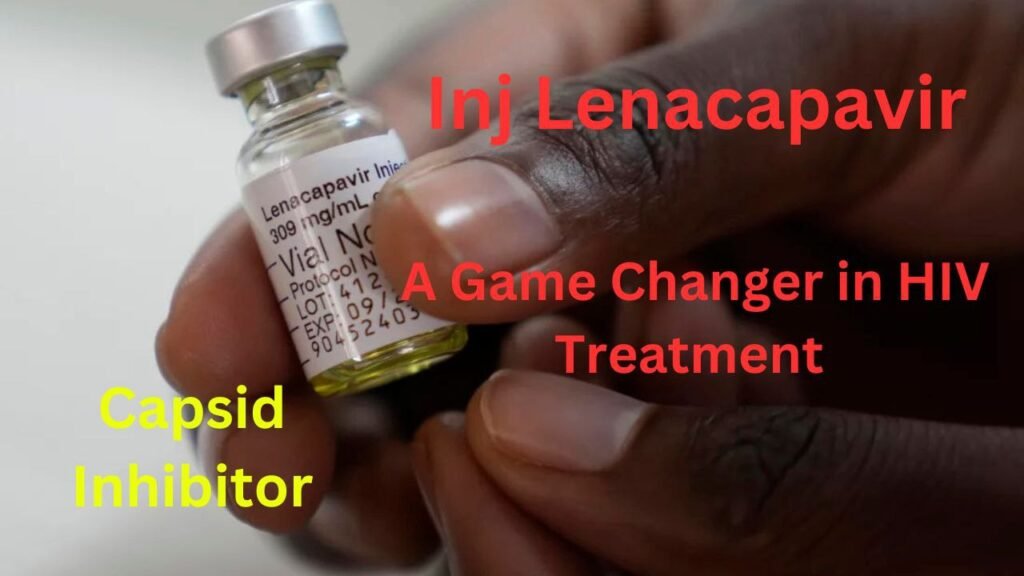Lenacapavir: A Game-Changer in HIV Treatment
In the ongoing battle against HIV, a new weapon has emerged: Lenacapavir. This innovative medication, belonging to the class of capsid inhibitors, is revolutionizing the way HIV is treated, particularly for those with multidrug-resistant strains.

Understanding Lenacapavir
Lenacapavir is a medication used to treat HIV-1 infection in adults. It is a type of antiretroviral medication known as a capsid inhibitor. Capsid inhibitors work by blocking the HIV virus from entering cells, which helps to prevent the virus from spreading and replicating.
Lenacapavir is available in two forms: an oral tablet and a subcutaneous injection. The oral tablet is taken once a day, while the injection is given once every six months.
Lenacapavir is typically used in combination with other antiretroviral medications. It is not a cure for HIV, but it can help to reduce the amount of virus in the blood and improve the health of people with HIV.
Lenacapavir is a relatively new medication, and more research is needed to understand its long-term effects. However, it is considered to be a safe and effective treatment for HIV-1 infection.
Key Advantages of Lenacapavir
- Long-Acting Formulation: One of the most significant advantages of Lenacapavir is its long-acting formulation. It is administered as a subcutaneous injection every six months, offering a convenient and less frequent dosing regimen compared to traditional daily oral medications. This reduced dosing frequency can improve adherence and potentially lead to better treatment outcomes.
- Potent Antiviral Activity: Lenacapavir has demonstrated potent antiviral activity against a wide range of HIV strains, including those that are resistant to other antiretroviral medications. This makes it a valuable option for individuals with multidrug-resistant HIV, who often face limited treatment choices.
- Favorable Safety Profile: Clinical trials have shown that Lenacapavir is generally well-tolerated, with manageable side effects. The most common side effects reported include injection site reactions, fatigue, and headache.
- Potential for HIV Prevention: In addition to its role in HIV treatment, Lenacapavir is also being studied as a potential preventive medication. Its long-acting nature makes it a promising candidate for pre-exposure prophylaxis (PrEP), which can significantly reduce the risk of HIV acquisition.
How Lenacapavir is Administered
Lenacapavir is administered as a subcutaneous injection, typically in the abdomen or thigh. The injection is given by a healthcare provider and takes only a few minutes. While the initial dose requires a two-week oral loading phase, subsequent doses are administered every six months.
The Future of HIV Treatment
The development of Lenacapavir represents a significant milestone in the fight against HIV. Its long-acting nature, potent antiviral activity, and favorable safety profile make it a promising treatment option for individuals with multidrug-resistant HIV. As research continues, it is possible that Lenacapavir may also play a role in HIV prevention strategies.
Conclusion
Lenacapavir offers a new hope for individuals living with HIV, particularly those with treatment-experienced infections. Its long-acting formulation, potent antiviral activity, and favorable safety profile make it a valuable addition to the existing arsenal of HIV medications. As research progresses, it is anticipated that Lenacapavir will continue to shape the future of HIV treatment and prevention.
Additional Considerations
- Individualized Treatment Plans: It is important to note that treatment decisions should be made on an individual basis, taking into account factors such as viral load, CD4 cell count, drug resistance patterns, and overall health status.
- Adherence to Treatment: Adherence to the prescribed treatment regimen is crucial for optimal outcomes. Healthcare providers should work closely with patients to develop strategies to improve adherence and address any barriers to treatment.
- Ongoing Monitoring: Regular monitoring of viral load, CD4 cell count, and other relevant laboratory parameters is essential to assess treatment response and identify any potential side effects.
For more regular updates you can visit our social media accounts,
Instagram: Follow us
Facebook: Follow us
WhatsApp: Join us
Telegram: Join us
